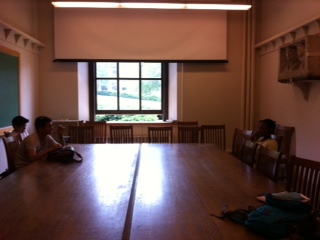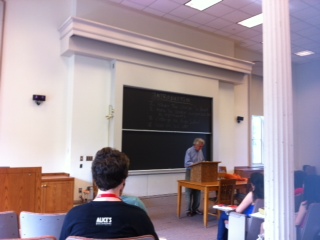What is the difference between a chair and justice? Why is it that
the range of disagreement when defining justice is so much broader than when
defining a chair? What is freedom?
These are only a few of the questions that
racked my brain this first day of class. Professor Kramnick delivered an
interesting introduction to the course before sending the students to their
discussion sessions. The discussion sessions are held every day and are
facilitated by three teacher assistants who manage groups of approximately
twenty students.
Professor Kramnick reviewing the main topics
to be covered.
|
Kevin, an undergraduate studying French
political thought, was my teacher assistant and led the group to a separate
building, which was assigned to us after a mistake in the paperwork. There was
no air conditioning, although there was a large square fan to relieve some of
the blistering heat. The students introduced themselves, and I was surprised to
see two non-high school students in the crowd. One of them is an undergraduate,
and the other a teacher from Belgium working toward a PhD.
The first half of the session was a general summary of the course
and how it will be organized. After lunch, we began our first discussion: what
is the difference when defining a chair, as opposed to defining justice? A
common answer would be that the first defines a physical object, whereas the
latter refers to an abstract concept which enables more room for deviation of
thought. When thinking of a chair, people will often think of the physical and functional
qualities of the object; some may describe a chair as a piece of furniture or a
tool for sitting and few would define a chair in a more conceptual context as a
symbol of power and superiority (ex. a chairman). Justice, however, is often
thought of as a concept and therefore people may view it as the police, the act
of righteous judgment, or in Plato’s preliminary words, the “advantage of the
stronger.” The ambiguity of justice allows for 360 degree analysis from various
standpoints, and such a range of variation of thought only expands when
defining freedom.
 |
| The discussion room for my group, last names G-P. |
The meaning of freedom has long been the subject of debate
throughout centuries of human history. Freedom may be defined as the lack of
restraint, lack of restriction, lack of being influenced by fear of judgment or
negative sanctions. On the other hand, justice may be defined as having choice-
being able to choose which job to take or what action to take. However, the
issue of internal freedom arises, for if your thoughts are influenced by
others, is that a free choice you are making?
While on the topic, Kevin brought up another curious paradox as “food
for thought” since we ran out of time. He is exceptionally intelligent and
speaks “a mile a minute” as he described, and the discussion ran eight minutes
over time. We turned in our essays on our definition of freedom, but before he
let us leave he described the following situation: during the time of slavery
in America, many slaves were so affected by the community opinions that they
embraced slavery and willingly chose to be enslaved because they believed it
was their natural place in society. They willingly chose to be enslaved, but
their opinions were the product of society’s negative influence; does this fall
under freedom?
 |
The gorge from the left side of the bridge on the way to Bailey Hall
from North Balch and Risley Hall.
|
The two hours spent in the discussion session today really opened
my eyes. I was shocked by the depth of insight and complexity of thought that
engulfed me on the first day of class, because I had heard Freedom and Justice
was an easy course. I am glad the rumors were wrong and I cannot wait to learn
more tomorrow. Sitting in the discussion room, I felt as though I was
surrounded by real intellectuals- students who really cared about education and
being successful. The discussions were open and peers freely debated while
maintaining a positive atmosphere. My knowledge and awareness has increased, as
well as my capacity to learn.

No comments:
Post a Comment